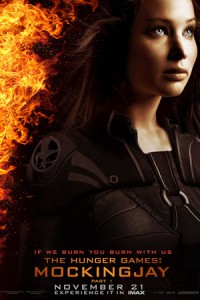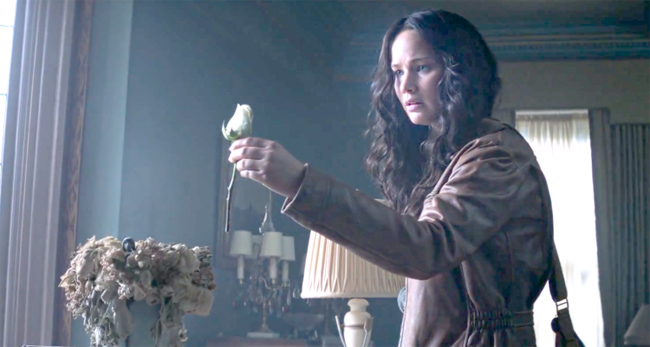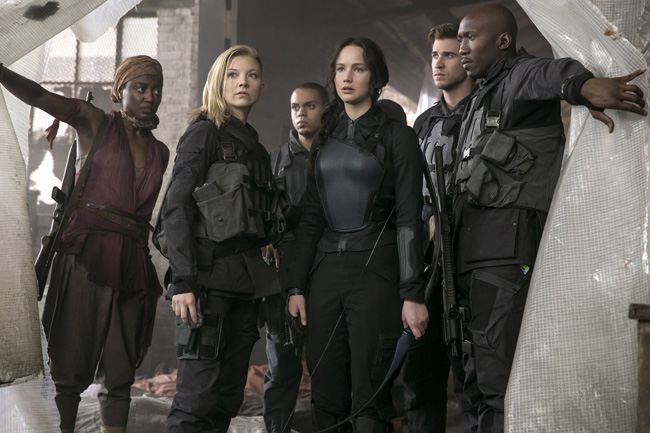
Written for the screen by Peter Craig and Danny Strong
Directed by Francis Lawrence
USA, 2014
In a previous review of the second instalment of The Hunger Games series for this website, I expressed some dismay that Catching Fire didn’t really have a conclusion to speak of, with its cliffhanger ending reminding me less of The Empire Strikes Back and more of The Matrix Reloaded or Pirates of the Caribbean: Dead Man’s Chest. The argument I made was that what makes the Star Wars film still satisfying is that it has an actual sense of narrative progression and character achievement despite abandoning its players in the midst of doom and gloom. Going back and revisiting Catching Fire, I admit I may have been a little harsh as quite a bit of substantial material in terms of world-building and character development is crammed in there before the game-changing reveal. The same cannot be said, however, for Mockingjay – Part I, which, in its eking out of just one half of Suzanne Collins’ final Hunger Games novel, is much more deserving of that complaint and is by far the least satisfying film of the series to date.
Having been rescued from the ‘Quarter Quell’ Hunger Games at the end of Catching Fire, Katniss Everdeen (Jennifer Lawrence, still doing fine work with the role) is brought to District 13, an area of Panem previously thought destroyed but one has actually remained active underground as the hub of a new uprising against President Snow (Donald Sutherland) and the Capitol. The film’s central conflict concerns Katniss’s reluctant acceptance about becoming the figurehead of the rebellion, with Plutarch Heavensbee (Philip Seymour Hoffman, in his final role) trying to convince revolution leader Alma Coin (an icy Julianne Moore) of the girl’s worth for igniting the fire to set off the Panem people. Katniss is regularly distracted by the Capitol’s use of hostage Peeta (Josh Hutcherson) as their own propaganda tool, and so lays out her own terms in exchange for becoming the ‘Mockingjay’ symbol for the uprising: rescue Peeta and the other hostages (including Jena Malone’s Johanna) at the nearest opportunity. Aside from also getting to see District 13 make some propaganda videos, that’s… really all there is to this plot, unless you imagine the Moore and Hoffman scenes as an alternate universe version of Magnolia.

In Mockingjay’s favour, returning director Francis Lawrence retains some of his skill with atmosphere of tension, with one extraction set-piece in the final act (though it feels strange to even call it a final act) proving particularly thrilling, and there’s some great horror elements to the depiction of Katniss’s destroyed former home in District 12. Perhaps by the very nature of its predominantly underground setting, however, there’s very little oomph to the film’s visuals outside of these select scenes; one hopes the 70mm film stock and more eye-popping locales used for parts of Catching Fire might be returning for the fourth movie.

The splitting of the conclusions of recent fantasy or sci-fi franchises into two parts (or more – looking at you, Peter Jackson) has been financially successful for Hollywood studios, but less so creatively. Only arguable trendsetter Harry Potter and the Deathly Hallows: Part I proved a satisfying film in its own right by being so rich in character interplay and having an actual sense of progression. Mockingjay – Part I is heavy on character beats, but they are repetitive ones due to its limited scope through withholding all the big stuff until Part 2.
It’s all preamble; all prologue. It’s a war movie where the main characters argue in a bunker, rarely getting their hands dirty, while the actual death and destruction they’re discussing is happening outside in brief bursts of action the viewer occasionally gets to see. It’s hard to make an insurrection film have impact when the escalation feels more like minor incident.
— Josh Slater-Williams

